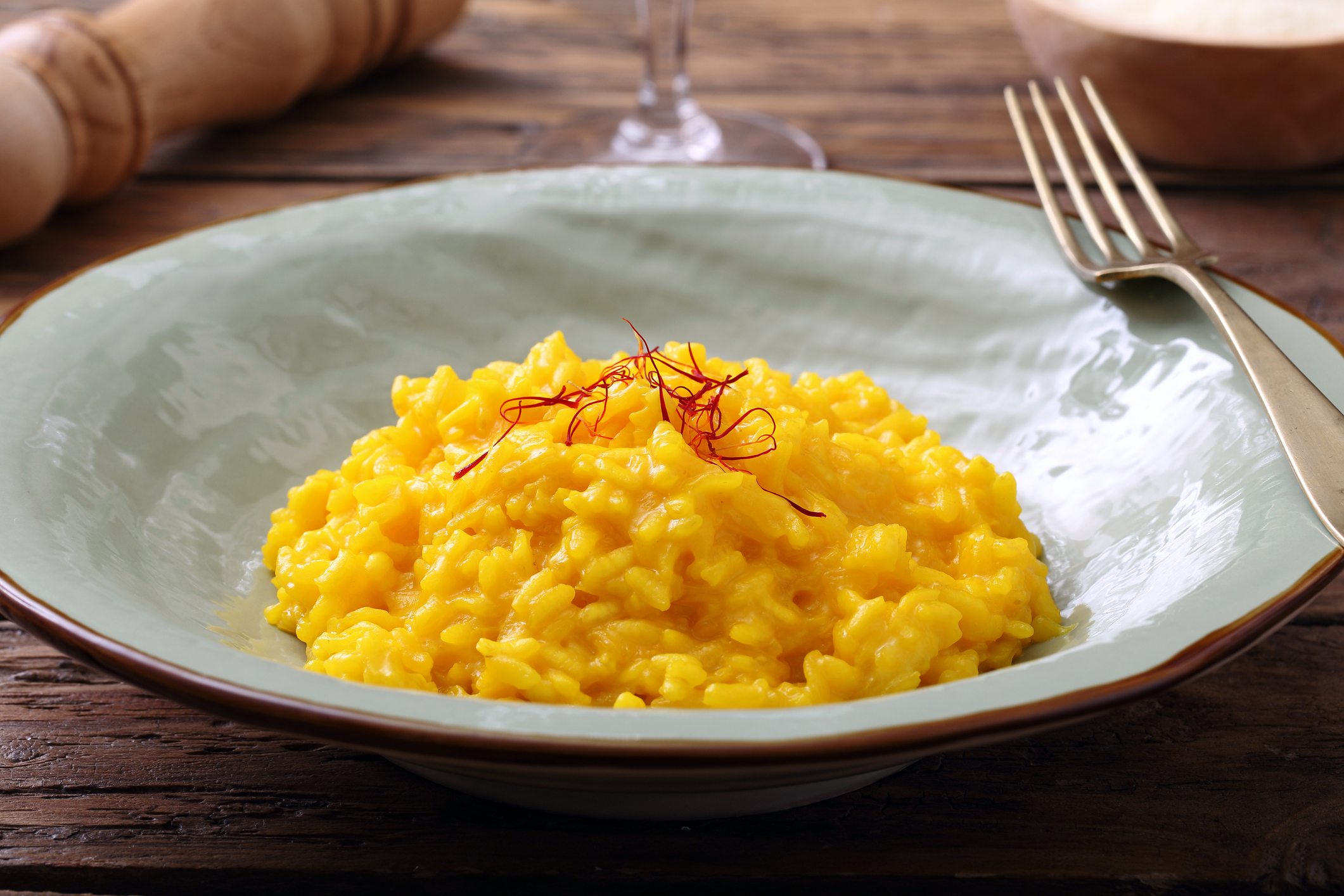Risotto, once the province of the finest Italian restaurants and saffron, once the province of royalty come together to make one of Milan’s signature dishes, risotto allo zafferano. Starch, wine and broth are transformed into the color of monk’s robes as they enrobe the plump grains of rice. This most luxurious of all risotti has delighted diners for decades.
Risotto came into its own in the U.S. during the foodie awakening of the 1980’s. Prior to that it was found mostly in white tablecloth establishments, much less often in the home. That all changed however, when Americans were introduced to Giuliano Bugialli and Marcella Hazan. These masters transformed the way Americans ate, and risotto quickly became one of their most popular dishes. Housewives and foodies across the country sought out Italian rice and learned to make their own stocks and broth.
They ventured into Italian markets to find Parmigiano Reggiano and northern Italy’s finest white wines. No longer did chicken and rice dinners mean plain boiled white rice topped with a pat of butter. Suddenly “mantecatura” was common parlance, and dinner parties started in the kitchen as guests took turns stirring the risotto. Happily, today the rice, wine and cheese can be found at many supermarkets and risotto makes frequent appearances on dinner tables across the country.
It all starts with the rice. And short grain Italian “japonica” rice is the order of the day. Of the four grades of Italian rice, I prefer superfino, although semifino rice, such as Vialone Nano is the choice of some cooks, and certainly makes a lovely risotto. The grains of superfino are the largest and plumpest of the Italian family of rices. Although they take longer to cook than other grades, risotto made with them reaps the benefit of extended time in the pot by absorbing more of the flavorful broth. And of the superfino varieties I prefer carnaroli.
When the risotto rage first took hold we were all using arborio, then the most commonly available of the Italian rices. But over time and with the ever widening array of imports, carnaroli has taken first place in my kitchen. Many brands are available, but I prefer Acquerello (usa.acquerello.it), an organic aged rice produced grown by the Rondolino family on their estate Tenuto Colombara in the heart of Vercelli province in Piemonte.
And then there’s the saffron, the dried stigmas of the crocus Sativus, arguably the Queen of all spices. Treasured through the ages, Cleopatra is said to have bathed in it, the Romans prized it, and wars were fought over it. Originally from the middle east, saffron was introduced to Italy in 1300 when it was brought from Spain by a Dominican friar. Cultivation spread across Italy, but declined over time as saffron gave way to other crops leaving just three areas of production, Sardegna, Val d’Orcia and Navelli in Abruzzo. Today the saffron produced in the Navelli comune of L’Aquila is regarded as Italy’s finest, and has earned DOP status.
Risotto allo Zafferano
3 tablespoons olive oil
4 tablespoons unsalted butter, divided
1 small yellow onion, very finely minced
2 cups Acquerello rice
about 6 cups brodo di pollo (chicken broth)
generous 1/2 teaspoon saffron threads
3/4 cup dry white wine
3 ounces grated Parmigiano Reggiano
Bring brodo to a boil, reduce heat slightly, keeping brodo almost boiling.
Toast saffron lightly by placing it in a large metal spoon and holding it about 2 inches over a gas flame until it just becomes fragrant. Use a mortar and pestle to grind saffron very finely. Set aside.
Place olive oil, 1 tablespoon butter and minced onion in deep 4 quart saucepan with a heavy bottom. Over low heat, saute onion until it is softened and translucent, about 8 minutes. Add rice to pan and toast lightly, being careful not to brown either onion or rice.
Add a bit of the wine to the ground saffron and stir. Add to saucepan. Use a bit more wine to wash all the saffron into the saucepan. Add remaining wine, and cook, stirring occasionally until almost dry.
Add enough hot brodo to cover the rice by about ½ inch, stirring very frequently to prevent sticking and scorching and to keep rice uniformly and constantly wet. Continue adding hot brodo in several additions to cover by ½ inch after the previous addition has been absorbed.
When most of the broth has been absorbed and the rice is al dente, (at about 20 minutes) remove pan from heat. And now for the mantecatura – beat in the remaining butter and the Parmigiano. This step binds the risotto and gives it its characteristic creamy texture. Check for seasoning, adding salt and pepper if needed. Spoon into very low bowls or onto flat plates and serve immediately.
Both Marcella Hazan and Giuliano Bugialli have written numerous excellent books. I recommend all of them, but if you are just starting, try Essentials of Classic Italian Cooking by Marcella Hazan or The Fine Art of Italian Cooking by Giuliano Bugialli.
Questions? Email me at adri@AdriBarrCrocetti.com or visit AdriBarrCrocetti.com































